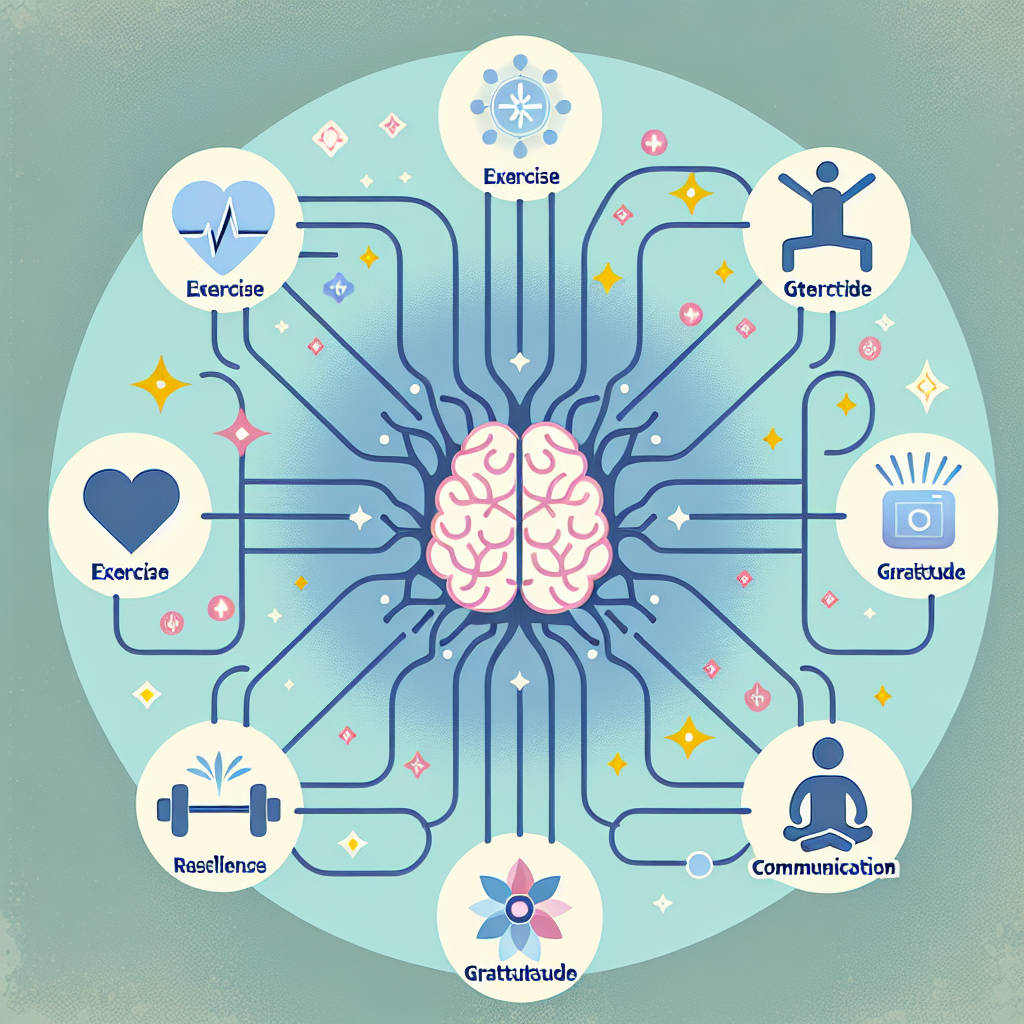In the midst of a crisis, finding effective strategies to manage stress and maintain morale is crucial. It is during these challenging times that our emotional well-being can be tested, but fear not, as there are practical approaches that can help you navigate through the storm. Prioritizing self-care, maintaining open lines of communication, and fostering a sense of community are just a few of the strategies that can empower individuals and teams to face adversities head-on and emerge stronger on the other side. So, let’s explore these strategies that can become your guiding light in times of crisis.
Acknowledge and Address Stress
In times of crisis, it is essential to acknowledge and address the stress that employees may be experiencing. By recognizing the signs of stress and creating a supportive environment, you can help employees manage their stress effectively and maintain their morale.
Recognize the Signs of Stress
Stress can manifest in various ways, both physically and emotionally. Some common signs of stress include increased irritability, difficulty concentrating, changes in appetite or sleep patterns, and feelings of overwhelm or anxiety. By being aware of these signs, you can identify when employees may be under stress and provide them with the necessary support.
Create a Supportive Environment
To address stress effectively, it is crucial to cultivate a supportive environment within the workplace. This involves fostering an atmosphere where employees feel safe and comfortable discussing their stressors and seeking assistance when needed. Encouraging an open-door policy and creating channels for employees to express their concerns can go a long way in alleviating stress and nurturing a positive work culture.
Encourage Open Communication
Open communication is key to managing stress and maintaining morale during a crisis. Encourage employees to openly share their thoughts, feelings, and concerns with both their supervisors and colleagues. By creating a safe space for communication, employees will feel heard, understood, and supported, which can significantly reduce their stress levels and boost morale.
Offer Stress Management Resources
To effectively address stress, it is essential to provide employees with the necessary resources to manage it. This can include offering access to stress management workshops, providing educational materials on stress reduction techniques, and implementing programs such as meditation or mindfulness sessions. By equipping employees with the tools they need to cope with stress, you empower them to take control of their well-being and maintain their morale in the face of a crisis.
Promote Work-Life Balance
Maintaining a healthy work-life balance is crucial for managing stress and preserving morale, especially during times of crisis. By encouraging time off and breaks, implementing flexible work arrangements, and promoting physical exercise and healthy habits, you can support employees in achieving a sense of balance and well-being.
Encourage Time Off and Breaks
Encourage employees to take regular breaks throughout the workday and to use their allocated vacation time. Taking breaks allows individuals to recharge, refocus, and reduce stress levels. By promoting a culture that values breaks and time off, you send a clear message that employees’ well-being is a priority, which can significantly contribute to improved morale and productivity.
Flexible Work Arrangements
During a crisis, flexibility in work arrangements becomes even more essential. Implementing flexible schedules, remote work options, or alternative work hours can help employees better manage their personal and professional responsibilities. By accommodating the diverse needs of your employees, you enable them to juggle their commitments effectively, reducing stress and improving overall morale.
Promote Physical Exercise and Healthy Habits
Encouraging physical exercise and healthy habits is an effective way to manage stress and enhance overall well-being. Provide resources and initiatives that promote physical activity, such as offering on-site fitness facilities or organizing group exercise classes. Additionally, promote healthy habits such as proper nutrition and sufficient sleep, as these factors play a significant role in managing stress. By prioritizing employee health, you create an environment that fosters optimal performance and elevated morale.

Provide Clear Communication
Clear communication is vital during times of crisis as it helps employees understand what is expected of them and keeps them informed about any changes or updates. By keeping employees informed, establishing clear expectations, and offering guidance and support, you can ensure that everyone is on the same page, reducing uncertainty and stress.
Keep Employees Informed
Transparency is key when managing stress and maintaining morale. Keep employees informed about any relevant updates, changes in policies or procedures, and how the crisis may impact their work. Regularly share information through channels such as company-wide meetings, emails, or intranet platforms. By providing timely and accurate information, you foster trust, alleviate uncertainty, and reduce stress levels.
Establish Clear Expectations
Unclear expectations can contribute to stress and confusion among employees. Clearly define goals, responsibilities, and performance expectations, ensuring that everyone understands their role and what is expected of them. Provide clear guidelines and resources to support employees in meeting these expectations. By establishing and communicating clear expectations, you create a sense of structure and direction, promoting confidence and morale.
Offer Guidance and Support
During a crisis, employees may face unique challenges that require guidance and support. Be proactive in offering assistance, and make yourself available to address any questions or concerns employees may have. Provide access to resources such as mentoring programs or training opportunities to enhance employees’ skills and confidence. By offering guidance and support, you demonstrate your commitment to employee success and well-being, resulting in increased morale and reduced stress.
Cultivate a Positive Work Culture
Creating a positive work culture is essential for managing stress and maintaining high morale among employees. By leading by example, recognizing and appreciating efforts, promoting collaboration and teamwork, and fostering a sense of belonging, you can cultivate a supportive environment where employees thrive.
Lead by Example
As a leader, your behavior sets the tone for the entire organization. Lead by example by demonstrating positive attitudes, effective stress management techniques, and a healthy work-life balance. Show empathy and understanding toward employee concerns, and openly communicate your commitment to their well-being. When employees see their leaders embodying these principles, they are more likely to follow suit, contributing to a positive work culture and increased morale.
Recognize and Appreciate Efforts
Recognizing and appreciating employee efforts is crucial for morale and stress management. Regularly acknowledge and celebrate individual and team accomplishments, and provide feedback that highlights their strengths and contributions. This recognition goes a long way in boosting employee morale, fostering a positive work environment, and reducing stress levels.
Promote Collaboration and Teamwork
Promoting collaboration and teamwork creates a sense of camaraderie and support among employees, which is crucial during times of crisis. Encourage employees to work together on projects or initiatives, provide opportunities for cross-functional collaboration, and foster a team-oriented environment. By promoting collaboration, you create a network of support that can alleviate stress and increase morale through shared responsibilities and successes.
Foster a Sense of Belonging
A strong sense of belonging is essential for employee well-being and morale. Foster a sense of belonging by creating opportunities for social interaction, such as team-building activities or office events. Encourage inclusivity and diversity, ensuring that every employee feels valued and respected. By fostering a sense of belonging, you eliminate feelings of isolation and promote a positive work culture where employees can thrive.

Utilize Stress Reduction Techniques
Implementing stress reduction techniques can significantly contribute to managing stress and boosting morale. By encouraging mindfulness and meditation, promoting stress-relief activities, offering employee assistance programs, and teaching stress-management strategies, you provide employees with the tools to cope with stress effectively.
Encourage Mindfulness and Meditation
Mindfulness and meditation are powerful techniques for managing stress and enhancing overall well-being. Encourage employees to incorporate mindfulness practices into their daily routines by providing resources such as meditation apps or organizing guided meditation sessions. By promoting mindfulness and meditation, you enable employees to cultivate a sense of calm and reduce stress levels, leading to improved morale and productivity.
Promote Stress-Relief Activities
Engaging in stress-relief activities is essential for combating the negative effects of stress. Offer resources and initiatives that promote stress relief, such as yoga classes, relaxation exercises, or access to nature. Encourage employees to take breaks and engage in activities that help them unwind and recharge. By promoting stress-relief activities, you create an environment that supports employees’ well-being and rejuvenation, ultimately improving morale.
Offer Employee Assistance Programs
Employee assistance programs (EAPs) provide valuable support for managing stress and addressing personal challenges. These programs often include services such as counseling, financial assistance, and legal support. Offer access to EAPs and communicate their availability to employees. By providing these resources, you demonstrate your commitment to supporting employee well-being and creating a workplace that values mental health.
Teach Stress-Management Strategies
Educating employees on stress-management strategies equips them with the skills to navigate through challenging times. Offer training sessions or workshops on stress management techniques, such as time management, prioritization, and effective communication. Provide employees with tangible tools and strategies they can implement to reduce stress and enhance their overall well-being. By teaching stress-management strategies, you empower employees to take control of their stress levels and maintain their morale during crises.
Ensure Adequate Resources
Having access to sufficient resources is essential for managing stress and maintaining morale during a crisis. By allocating sufficient staff and support, providing accessible tools and technology, and offering training and development opportunities, you enable employees to perform their work effectively and efficiently.
Allocate Sufficient Staff and Support
An overloaded workforce can significantly contribute to stress and burnout. Ensure that workloads are manageable by appropriately allocating staff or hiring additional resources if necessary. Provide support through mentorship programs, coaching, or peer collaboration. By allocating sufficient staff and support, you prevent excessive stress levels and enable employees to focus on their tasks with enhanced morale.
Provide Accessible Tools and Technology
Access to accessible and efficient tools and technology is vital for productivity and stress management. Ensure that employees have the necessary equipment, software, and resources to perform their work effectively. Regularly assess and update technology systems to minimize frustration and stress caused by outdated or insufficient tools. By providing accessible tools and technology, you facilitate a smooth workflow and reduce stress levels.
Offer Training and Development Opportunities
Investing in training and development opportunities demonstrates a commitment to employee growth and well-being. Offer workshops, seminars, or online courses to enhance employees’ skills, knowledge, and capabilities. By providing these opportunities, employees feel valued, motivated, and engaged, leading to increased morale and decreased stress levels. Investing in employee development is a win-win situation, benefiting both the individual and the organization during times of crisis.
Encourage and Allow Autonomy
Encouraging autonomy among employees promotes a sense of ownership, empowerment, and reduced stress levels. By empowering employees, delegating responsibilities, encouraging decision-making, and allowing flexibility in approach, you create an environment that promotes independence and thriving.
Empower Employees
Empowering employees to take ownership of their work fosters a sense of autonomy and reduces stress. Encourage employees to make decisions, solve problems, and take initiative within their roles. Provide them with the necessary resources and support to succeed. By empowering employees, you demonstrate trust and confidence, which enhances their morale and reduces stress associated with micromanagement.
Delegate Responsibilities
Delegating responsibilities is essential for managing workload and reducing stress levels. Identify tasks that can be effectively distributed among team members and delegate accordingly. Ensure that responsibilities are aligned with each employee’s strengths and interests. Delegating tasks empowers employees to take ownership, develop new skills, and reduce stress associated with an overwhelming workload.
Encourage Decision-Making
Encouraging employees to make decisions within their scope of authority promotes autonomy, confidence, and reduced stress. Provide clear guidelines and parameters to ensure informed decision-making. Encourage employees to analyze situations, consider alternatives, and make decisions based on sound judgment. By empowering employees to make decisions, you create a culture of responsibility and accountability, leading to increased morale and reduced stress levels.
Allow Flexibility in Approach
Supporting flexibility in approach allows employees to adapt to changing circumstances and reduces stress associated with rigid processes. Encourage employees to explore different approaches to tasks, problem-solving, or projects. Provide the freedom to innovate and experiment within well-defined boundaries. By allowing flexibility in approach, you foster creativity, reduce stress associated with limitations, and empower employees to find efficient solutions.
Support Employee Well-being
Supporting employee well-being is crucial for managing stress and maintaining morale during a crisis. By offering mental health support, providing resources for self-care, and creating a positive physical work environment, you prioritize the holistic well-being of your employees.
Offer Mental Health Support
Mental health support is essential for managing stress and ensuring employee well-being. Provide access to mental health resources such as counseling services, workshops on stress reduction, or mental health first aid training. Create a culture that eliminates stigma around mental health and encourages open conversations about well-being. By offering mental health support, you demonstrate empathy, provide reassurance, and contribute to a positive work environment.
Provide Resources for Self-Care
Self-care plays a vital role in managing stress and promoting well-being. Provide resources and information on self-care practices such as mindfulness exercises, relaxation techniques, or strategies for work-life balance. Encourage employees to prioritize self-care and model these practices yourself. By promoting self-care, you empower employees to cultivate their well-being, which positively impacts their stress levels and morale.
Create a Positive Physical Work Environment
The physical work environment has a significant impact on employee well-being and stress levels. Create a workspace that promotes comfort, ergonomics, and cleanliness. Incorporate elements of nature, such as plants or natural lighting, to enhance well-being. Encourage a supportive and respectful atmosphere among employees. By creating a positive physical work environment, you contribute to reduced stress levels, increased morale, and overall employee satisfaction.
Establish Crisis Response Plans
During a crisis, it is crucial to have well-defined plans in place to effectively respond to challenges and mitigate stress. By developing contingency plans, identifying key roles and responsibilities, and regularly testing and revising plans, you ensure preparedness and maintain morale in the face of uncertainty.
Develop Contingency Plans
Developing contingency plans prepares your organization to respond effectively to crises. Identify potential scenarios and outline strategies to address them. Assign roles and responsibilities to ensure a coordinated response. Regularly assess and update these plans to reflect changing circumstances. By developing contingency plans, you instill a sense of security, reduce stress levels, and maintain morale by demonstrating proactive and strategic leadership.
Identify Key Roles and Responsibilities
Clearly identifying key roles and responsibilities during a crisis provides employees with a sense of direction and purpose. Define roles and assign responsibilities based on individuals’ skills and expertise. Communicate expectations and decision-making authority clearly. By assigning responsibilities, you empower employees to take ownership, reduce uncertainty, and maintain morale under challenging circumstances.
Test and Revise Plans Regularly
Regular testing and revision of crisis response plans are essential for their effectiveness. Conduct drills or simulations to ensure that employees understand their roles and are familiar with the plan’s implementation. Identify areas for improvement and revise plans accordingly. By testing and revising plans regularly, you fine-tune your crisis response capabilities, instill confidence, and reduce stress associated with uncertainty.
Encourage Peer Support and Bonding
Peer support and bonding contribute significantly to managing stress and fostering a positive work environment during a crisis. By facilitating team-building activities, promoting supportive relationships, and providing opportunities for social interaction, you create a sense of unity and support among employees.
Facilitate Team Building Activities
Team-building activities help employees connect, support one another, and build relationships outside of their immediate work tasks. Organize team-building events, such as team lunches, retreats, or collaborative projects. Encourage employees to participate and engage in activities that promote teamwork and trust. By facilitating team-building activities, you create a sense of camaraderie, reduce stress, and enhance morale within the organization.
Promote Supportive Relationships
Promoting supportive relationships among employees is crucial for managing stress and maintaining morale. Encourage a culture of collaboration, respect, and empathy. Promote opportunities for mentoring, peer coaching, or cross-functional projects. Foster an environment where employees actively support and assist one another. By promoting supportive relationships, you create a network of support that reduces stress and fosters a positive work environment.
Provide Opportunities for Social Interaction
Social interaction among employees is vital for combating feelings of isolation and maintaining morale. Encourage social interactions through activities such as team lunches, informal gatherings, or virtual social events. Provide spaces, both physical and virtual, where employees can connect and build relationships. By providing opportunities for social interaction, you create a sense of belonging and foster a positive work culture that supports employees’ well-being.
In conclusion, managing stress and maintaining morale during a crisis requires a comprehensive approach that addresses various aspects of employee well-being. To effectively address stress, create a supportive environment, and encourage open communication. Promoting work-life balance through time off, flexible work arrangements, and healthy habits is essential. Clear communication, positive work culture, and stress reduction techniques play a vital role as well. Ensuring adequate resources, encouraging autonomy, supporting employee well-being, establishing crisis response plans, and promoting peer support and bonding are also key strategies. By implementing these strategies, you create an environment that fosters resilience, reduces stress, and maintains high morale even in challenging times.
